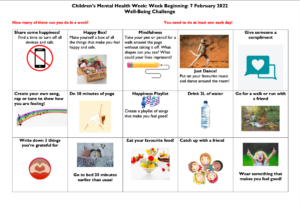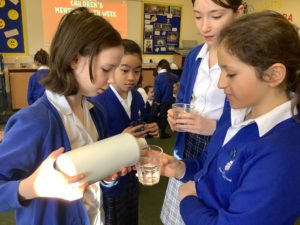In celebration of Children’s Mental Health Week, girls in Junior School have taken on a daily Well-Being challenge. They have a list of 15 tasks which are known to foster well-being, and have been challenged to do at least one per day, and see how many of the challenges they can complete within Children’s Mental Health Week.
“I listened to whale music.” – Florence (Reception).
“I did a dance with my little sister.” – Ivy (Reception).
“Ms Capper always gives us compliments about our writing.” – Florence.
Girls thought about what they are grateful for.
“I am grateful for my school, and grateful for my family,” said Hattie (Reception).

The Bottled Book
On Wednesday, the children looked at the Bottled book, a picture book to help children share their feelings. They talked about how bottles can become lighter when they share their contents, and how that is like we as people can feel lighter when we share our feelings. They looked at ways to start conversations with others whose feelings may be troubled. This chimes with our Quaker ethos and the idea of ‘seeing the light of God in others’. The authors, Tom and Jo Brassington and replied via twitter. “Thank you for using our book in such a beautiful way,” said Tom, and “Thank you so much for sharing – this has made me very proud and emotional on my lunch break,” said Jo.
“If someone was feeling sad, you could ask, ‘Do you want to play with us?’” – Hattie.
“If someone was feeling sad, you can talk about their feelings.” – Ivy.
“You can help calm them down and tell the teachers.” – Luna (Reception).
“You can ask them, ‘How are you feeling? Do you want to play or do you want to be on your own?‘” – Florence.
“If someone is feeling lonely you can ask them and they can tell you what they feel like. Then you can ask if they want to play.” – Brooke (Reception).

Mental Health in the Classroom
Our Junior School Creative Curriculum takes the Universal Design for Learning (UDL) approach, which removes barriers to learning to reduce pupil anxiety, and encourages mental health through pupils being able to associate positive experiences with learning experiences. Assessment activities follow the same ethos as the curriculum. Assessments are open ended, allowing the girls to think creatively and show their learning how they wish.
“The open ended nature of the tasks mean the girls must think carefully about what they know but then transfer their learning, so they are more likely to remember it! But most importantly it reduces anxiety – the activities are fun, and they can decide how they show their learning. This means I find out what they know because they are relaxed and able to think clearly! Reducing anxiety is a key component of the UDL approach,” said Ms Wilson.
For example, this half term pupils have been looking at rocks and fossils, and learning about the rock cycle. The task they were given this week had the following options:
- Using a tub of play dough, a pencil and a Post It Note, show me what you know about the rock cycle.
- Tell me the story about the day a worm went on a journey to find the bedrock.
Sarah, Hope’s mum, who was delighted with the outcome, wrote on twitter, “What I love about your Creative Curriculum is each girl can access their preferred medium of learning to demonstrate their understanding & capability in the way that suits them best. Be that writing, artistically or as my dyslexic worm shows, through action.”
When your daughter is at a school that allows her to learn HER way, whilst developing some awesome IT skills along the way ❤️🥰🐛 https://t.co/pjfDOsF9W0
— Sarah Day (@sarahlouiseday) February 10, 2022
And finally, the whole School celebrates Children’s Mental Health Week today with a dress-up day encouraging people to dress in a way they feel best expresses themselves.
